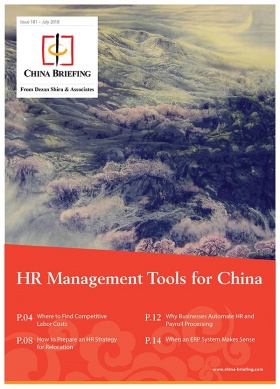When an ERP System Makes Sense in China
Enterprise resource planning (ERP) systems are software applications that integrate internal business processes and automate routine back-office tasks. An ERP system can integrate everything from production, marketing, human resources (HR), sales, and payroll into a single database and user interface.
Choosing to deploy an ERP system in China can be a difficult decision. A poorly deployed ERP system can become a major liability and even disrupt the workflow it is meant to streamline. Problems in the implementation process typically occur because of insufficient knowledge regarding local regulations or because of weak internal controls that were left unchanged during implementation.
However, the value of a well-deployed ERP system cannot be overstated. With a few proactive steps, businesses can effectively implement a cost-effective ERP system that improves productivity and transparency.
China Briefing spoke with Phoebe Yan, Dezan Shira & Associates’ IT Applications Manager, who was responsible for overseeing Dezan Shira’s own internal ERP implementation, to better understand the benefits and challenges of deploying an ERP system in China.
China Briefing: Why should companies consider an ERP system in China?
Phoebe Yan: In China, foreign businesses often struggle with productivity, transparency, and internal controls. ERP systems synchronize a company’s internal processes, allowing for greater standardization in routine tasks, real-time data, and compliance with local laws. These are especially important when management teams are not based in China.
ERP systems make a company more agile while organizing and stabilizing their long-term growth. An ERP system optimizes business processes and then – importantly – formalizes these improvements. This ensures that employees follow best practices and creates a clear, reliable picture of a company – allowing management to make accurate forecasts and informed decisions.
China Briefing: When should companies consider ERP implementation?
Phoebe Yan: ERP systems have changed greatly in the last 10 years. ERP systems can now be hosted online and businesses can ‘subscribe’ to the service, paying a monthly or annual fee proportionate to the number of employees and volume of work.
This change is part of the larger Software as a Service (SaaS) movement that is giving smaller companies access to enterprise-grade technology without having to pay enterprise prices or buy physical hardware. By subscribing to an ERP system, what would otherwise be a capital expense used for investing in a physical system is converted to an operating expense.
While there is no ‘magic number’ for when a company should switch to an ERP, there are warning signs that managers can pick up on.
Miscommunication between departments or offices, time lags in completing routine tasks, managers spending more time on paperwork than on core business – these are all telltale signs that a company is outgrowing its current business processing platforms or methods and should consider moving to an ERP.
However, companies do not have to wait for these signs to consider ERP implementation. Proactively upgrading software to anticipate growth will reduce downtime and expensive growing pains.
China Briefing: What are the alternatives to an ERP system?
Phoebe Yan: There are a number of accounting applications that businesses can integrate onto Cloud platforms. In this way, businesses remain cost-effective and flexible by avoiding large upfront costs on servers and digital infrastructure while still benefiting from a single access window and streamlined internal processes.
Alternatively, when a company has operations in several Asian countries, customized software for payroll and HR can actually make the most sense as it can accommodate a wide array of regulatory issues as well as multiple languages.
The point of any business processing software is to make a company more productive and to ensure that decision makers have access to all the latest, relevant company information. Ultimately, this should save a business money internally while helping it grow and expand its operations. To that end, businesses should perform a careful internal audit to make sure the software, hardware, or subscription service they opt for is going to achieve all of this.
If all else fails, there is still the old-fashioned spreadsheet.
China Briefing: Can companies deploy their existing ERP systems to Chinese offices?
Phoebe Yan: There are two key considerations companies should keep in mind when deploying their own ERP systems into China: connection speed and local regulations.
ERP systems hosted outside of China may face significant slowdowns while running in China which can be counter intuitive to the reason for deploying them in the first place. Secondly, ERP systems designed outside of China often require additional work to make them compatible with local compliance standards, such as China’s general accepted accounting principles (GAAP).
If a company’s principle ERP provider is operating in a conflicting time zone with China, and lack experts proficient in Chinese, the integration process can become slow and frustrating. In such cases, we recommend utilizing additional support from a professional services firm with experience in both IT and local accounting, and who have the capacity of working in English and Chinese.
China Briefing: What are some of the challenges to implementing an ERP system in China?
Phoebe Yan: Implementing an ERP system anywhere is a complex task and requires the committed attention of experts in IT, finance, and operations who understand the local environment as well as senior management who know their company in-and-out.
Planning is paramount; accordingly, one of the best proactive measures a business can take is to perform an internal audit. That way, a company can clean up their existing internal controls before they migrate them onto a new platform. Be sure to provide employees with post-deployment training and maintain on-call IT support for the weeks following a live ERP system.
Such small, proactive measures can make all the difference in an effective ERP deployment.
About Us
China Briefing is produced by Dezan Shira & Associates. The firm assists foreign investors throughout Asia and maintains offices in China, Hong Kong, Indonesia, Singapore, Russia, and Vietnam. Please contact info@dezshira.com or visit our website at www.dezshira.com.
- Previous Article How Foreign Investors and Traders in China can Profit from the Belt and Road Initiative
- Next Article Mobile Payments in China: Why Foreign Businesses Should Adopt a Strategy








